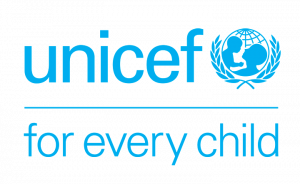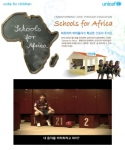Cholera outbreak poses additional threat to child survival in Angola
* * *
32,324 cases and 1,189 deaths (case fatality rate of 4 per cent) from 13 February to 10 May,
More than one third of cholera victims in Angola are children under the age of five, according to preliminary estimates by UNICEF.
GENEVA / LUANDA, 12 May 2006 - Faced with one of the highest under-five mortality rates in the world even in the best of times, Angola is struggling to contain the impact of the current cholera outbreak on children.
According to preliminary estimates by UNICEF, approximately 35 per cent of cholera victims are children under the age of five.
The government has reported a total of 32,324 cases and 1,189 deaths (case fatality rate of 4 per cent) from 13 February to 10 May, and while the epidemic reached a peak in some provinces, in other parts of the country the outbreak is still at an early stage. Almost 500 new cases, sometimes more, are reported daily and some estimate that the number could climb to over 70,000 cases by September if action to contain the outbreak is not sustained.
“Children are particularly vulnerable to dehydration from diarrhoea caused by cholera,” says Akhil Iyer, head of UNICEF in Angola, “and the current crisis threatens to exacerbate their already fragile health situation.”
Diarrhoeal diseases are one of the main causes of child mortality in Angola, accounting for 18 per cent of child mortality every year, after malaria which accounts for 23 per cent.
○ A development issue
The outbreak and quick spread of the cholera epidemic is largely due to poor sanitation and a shortage of safe drinking water in Luanda’s overcrowded urban slums, a legacy of almost 30 years of war. According to UNICEF and WHO, only 50 per cent of Angolans have access to safe water.
Mr. Iyer points out that responding to the current crisis is not enough. “While we have to deal with this emergency quickly, investment in major long term interventions such as safe water supply and sanitation is absolutely critical. Otherwise these sorts of outbreaks will continue to occur. ” he says.
○ Joint efforts
The Angolan government recently announced an allocation of US$5 million and several donors have contributed over US$ 1 million to UNICEF to help contain the outbreak.
The funds will be used mainly for supplies urgently needed for water purification and the treatment and prevention of cholera.
Under the leadership of the Ministry of Health, other government institutions, UN agencies, primarily UNICEF and the World Health Organization, and non-governmental organizations such as Medecins sans Frontieres, have teamed up to respond to the crisis. Cholera treatment centres have been established in affected areas with provision of medical supplies and technical guidance.
The National Cholera Task Force meets every day and sub-groups for affected provinces have been established to monitor the situation and coordinate case management, case surveillance, provision of safe water and sanitation and social mobilization activities. Information on cholera and how to prevent and treat it is being disseminated, reaching more than 850,000 people nationwide.
○ UNICEF response to date
In support of the nationwide response, UNICEF provided tents and basic equipment for establishing cholera control treatment centres.
So far, UNICEF has distributed 527,300 sachets of Oral Rehydration Salts (ORS) for cholera treatment centres, providing treatment to over 87,500 cholera patients, and 2,000,000 water purification tablets. Water treated with UNICEF´s support has been trucked into Luanda, providing a supply of safe water for 1,000,000 people. Twenty four water tanks have been installed in cholera affected areas and jerry cans are being distributed at household level. In addition, affected communities and their sources of water are being mapped out and a number of wells are being disinfected.
New delivery of jerry cans, water purification tablets, ORS, Doxycycline, Ringer Lactate and Calcium Hypochlorite is expected by next week.
TV and radio spots produced with support from UNICEF are being broadcast on national TV and national and local radio stations to educate 4,715,819 viewers and listeners about cholera prevention and what to do if someone contracts the disease.
To encourage good hygiene practices UNICEF is supporting house-to-house campaigns to reach 110,000 people in affected provinces with information material, logistical support and training of mobilisation teams.
In non-cholera affected provinces UNICEF is working with the provincial governments to minimise the risk of cholera spreading to those provinces.
유니세프한국위원회 개요
유니세프한국위원회는 한국에서 유니세프를 대표하는 기관(비영리법인)으로서 한국위원회의 주된 임무는 세계 어린이를 위해 국내에서 세계 어린이 현황과 유니세프 활동을 널리 알려 어린이돕기 기금을 조성하는 것입니다. 또한, 아동의 권리 홍보 및 모유수유 권장, 세계교육 등의 사업을 통해 어린이 권리를 신장하는 활동도 함께 펼쳐 나갑니다. 유니세프한국위원회가 국내에서 펼치는 모든 활동은 유니세프가 전세계적으로 펼치고 있는 어린이 구호활동을 지지하기 위한 것입니다.
웹사이트: http://www.unicef.or.kr
연락처
유니세프한국위원회 홍보부 김재명 대리 02-735-2315, 이메일 보내기


![방탄소년단의 글로벌 팬미팅 BTS 5TH MUSTER [MAGIC SHOP]에서 진행된 유니세프 부스 방탄소년단의 글로벌 팬미팅 BTS 5TH MUSTER [MAGIC SHOP]에서 진행된 유니세프 부스](https://file.newswire.co.kr/data/datafile2/thumb/2019/10/3554238800_20191024170202_4476783960.jpg)
